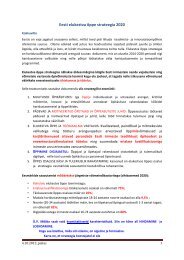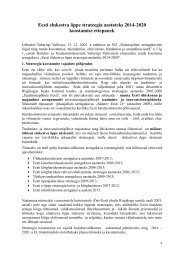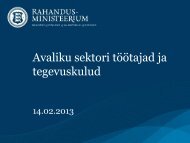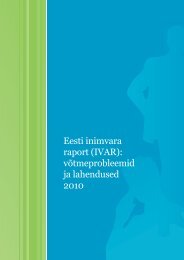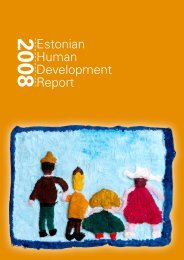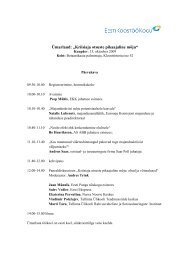DEVELOPMENT
The pdf-version - Eesti Koostöö Kogu
The pdf-version - Eesti Koostöö Kogu
Create successful ePaper yourself
Turn your PDF publications into a flip-book with our unique Google optimized e-Paper software.
tioning market economies (15 states), market economies<br />
with functional flaws (51 states), poorly functioning<br />
market economies (40 states) and rudimentary market<br />
economies (7 states). The economic transformation of the<br />
Czech Republic, Taiwan, Singapore, and Estonia were<br />
rated most highly. The majority of the new EU Member<br />
States are also in the group with developed market<br />
economies, except for Bulgaria, Latvia and Romania.<br />
Russia is classified among the states that have market<br />
economies with functional flaws, as are the majority of<br />
the other CIS states (Bertelsmann 2012: 41).<br />
The uniform strength of the political and economic<br />
dimensions have secured top positions for the new European<br />
Union Member States, which, by having fulfilled<br />
the requirements for membership, have already demonstrated<br />
progress in both democratisation and the transition<br />
to market economies. In 2003, 2006, 2008, 2010<br />
and 2012, there were five new EU Member States among<br />
the top ten: the Czech Republic, Slovenia, Estonia, Lithuania<br />
and Slovakia. Based on the 2008 index, Poland<br />
had dropped out of the top ten; and based on the 2012<br />
index, Hungary dropped out. The only one that was not<br />
among in the top ten at any time was Latvia, which is<br />
still in the group of democracies with highly advanced<br />
market economies. Of the non-European states/areas,<br />
the development that occurred in Taiwan from 2009<br />
to 2011 has been given the highest composite score.<br />
In democratisation, Uruguay has also gotten an almost<br />
maximum score, but its economic development has been<br />
more modest. Among the highly advanced states, we<br />
also find some of the other reference state in this report<br />
– Uruguay, Chile, Costa Rica and the South Korea. All<br />
of them can be viewed as developmental leaders in their<br />
region. In regard to economic development, Singapore<br />
has also been assessed quite highly (9.57 points in 2008,<br />
9.14 in 2010 and 9.18 in 2012), along with the Czech<br />
Republic, Taiwan and Slovenia.<br />
Based on the Management Index (2012), the transition<br />
countries were divided into five groups: with very<br />
good management (8 states); good management, but with<br />
shortcomings (36 states); moderately successful management<br />
(43 states); weak management (27 states); and failed<br />
management (14 states) – see Table 2.1.3.<br />
According to the Management Index in 2003, 2008,<br />
as well as 2010 and 2012, Estonia was one of the most<br />
successful transition countries, placing first, second and<br />
third position, respectively, and slightly behind, in seventh<br />
rank, in 2006. Of the other new EU Member States,<br />
only Lithuania and Slovakia are assessed as states with<br />
very good management, but not in all the years – Slovakia<br />
only four times, and Lithuania twice. Latvia is among the<br />
states with good management, but with shortcomings,<br />
but has improved its position somewhat in recent years.<br />
Based on the 2012 index, Taiwan and Brazil have received<br />
significantly better assessments than in previous years. Of<br />
the new EU Member States, the assessment of management<br />
in Slovakia and Slovenia have decreased somewhat<br />
in recent years, and it has fluctuated quite a bit in Lithuania,<br />
the Czech Republic and Poland.<br />
In the assessment of the management of governance<br />
processes, Hungary and Russia have suffered the<br />
greatest decrease. In the indices for 2003 to 2010, Hungary<br />
was among the countries with good management,<br />
but based on the 2012 index, they dropped out of this<br />
group, being the only new EU Member State among<br />
the moderately successful countries (declined from 12 th<br />
position, in 2003, to 48 th , in 2012). Russia has even<br />
declined by two country groups – from 31 st , based on<br />
the 2003 index (good management, but with shortcomings),<br />
to 87 th position in 2006 (moderately successful<br />
management), and finally, into the group of countries<br />
with weak management (98 th in 2008, 107 th in 2010<br />
and 99 th in 2012). According to the Status Index, in<br />
all the years between 1998 and 2011, the political and<br />
economic transformation in the Czech Republic, Slovenia<br />
and Taiwan was consistently more successful than<br />
in Estonia. Process management has been, consistently,<br />
very successful in Chile, and during the last few years,<br />
in Taiwan and Uruguay. However, when combining<br />
both indices through the years, Estonia’s transformation<br />
result has been better, and its positions in the<br />
ranking higher.<br />
Great attention was paid to the relative level of difficulty<br />
related to the specifics of each country’s development,<br />
which was calibrated by using an additional coefficient<br />
to make the final determination of the Management<br />
Index score.<br />
The calibration of the composite Management Index<br />
utilised a coefficient that can reduce the score in the final<br />
index up to 25% – if the value in the quality of management<br />
sub-index is 1.0, it was divided by a coefficient of<br />
1.250; if the value is 1.1, the coefficient is 1.246; if the<br />
value is 1.2, the coefficient is 1.242, etc, until a coefficient<br />
of 1.0, when the level of difficulty is 10.0. Between 2009<br />
and 2011, the highest level of management difficulty was<br />
assigned to Somalia (9.8) and Haiti (9.5). Of the states<br />
with moderately successful management, the level of<br />
difficulty was highest for the Central African Republic<br />
(8.5), Burundi (8.2), Rwanda (7.8) and Mauritania (7.8).<br />
Estonia is among the group of countries with relatively<br />
good management, with a level of difficulty, in 2012, of<br />
1.9. The lowest level of difficulty is assigned to Slovenia<br />
(1.1) and the Czech Republic (1.2).<br />
Based on a summary of the Status and Management<br />
Indices, based on the analysis of the transformation<br />
processes between 1998 and 2011, by the Bertelsmann<br />
Foundation, Estonia has been very successful. This is,<br />
primarily, thanks to the uniform scores and ranks of both<br />
the Status and the Management Index (see Table 2.1.4<br />
and Figure 2.1.1).<br />
It is important to note that the values of the process<br />
management index can also be comparatively low for<br />
successful transition countries (18 th rank for the Czech<br />
Republic and Slovenia; even 48 th rank for Hungary),<br />
which alludes to a poor capability to cope with crises.<br />
In the analytical summaries made on the basis of<br />
the Bertelsmann Transformation Index (BTI) 2012, it is<br />
recognised that it no longer makes sense to view the<br />
given lead group of countries – eight EU Member States<br />
in Eastern and Central Europe, three Latin American<br />
and two Asian states (see Table 2.1.3 and Figure 2.1.1)<br />
– as transition countries in the context of a transition<br />
to democracy and market economies, since this has<br />
already occurred. Underway is the consolidation of the<br />
Estonian Human Development Report 2012/2013<br />
65



